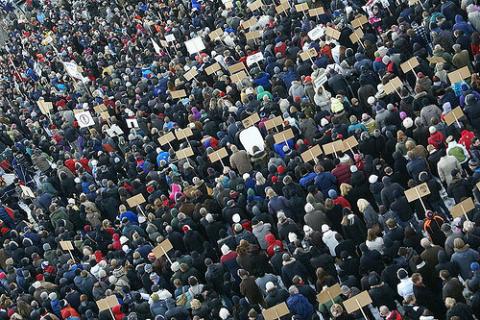Why don't Irish people protest more?

1. Our political system breeds apathy
A lot of Irish people are just apathetic. But apathy is not some kind of innate attitude we’re born with, rather it gets drilled into us by a political system that not only encourages bad behaviour from politicians but one that also discourages the rest of us from getting involved. With a political system as dysfunctional as ours of course people become apathetic. But it’s not because people don’t care; it’s just that people come to expect the worst because that’s what we’re used to.
2. Our religious history
With Church & State intertwined for so many years Ireland was a highly conservative society that was deferential to authority. This wasn’t the kind of environment where Leftist protest movements could develop as they did throughout Europe. We don’t have much of a history of protesting in this country so it’s taking us a long time to figure it out.
3. The Left?
While other democracies typically have a Left/Right political divide, left wing & centre-left parties in Ireland, despite receiving a significant swell of support in the last election, have never really been able to get people excited by a Left alternative.
4. Hijacking
Protests so far have commonly featured members of the United Left Alliance, Sinn Féin and other political groups showing up to proudly wave their banners. This gives the impression to passers-by that protests are a party-political affair and stops their numbers from growing, because partisanship always excludes some people. By contrast, successful protest movements, like those in Iceland and the Arab Spring countries, were unmediated by political parties.
5. The attitudes of young people
When young people in this country are faced with political injustice, rather than stand up against it, many of them simply refuse to put up with it, and there’s a difference. Not all, but many young people just emigrate, usually to a place where society is run better.
6. Our education system
Think back to CSPE. We were taught about politics along the lines of: “This is where the President lives, this is what s/he does” or “This is where the Dáil is, this is what they do.” It didn’t actually teach us how different political systems work, it just presented things as a given. Rather than teach us “how we do things in Ireland” it taught us “how things work in Ireland”. So it’s no wonder we’re not bothered to try and change our society for the better, when we were never encouraged to do so in the first place.
7. A preoccupation with work and money
In Iceland, people more or less agreed to put everything on hold until their crisis had been resolved. In Ireland however, while we seem to want change, we want to keep things generally moving as well. But then of course why would you want to risk rocking the boat with your employer, asking for time off or a different shift, so that you can go on a protest when we’re not even confident such protests would succeed in the first place?
8. Cynicism towards protesters
Because we’re not used to protesting, protesters are treated with an unusual degree of hostility. People muse about how protests are a waste of time, or a public nuisance, or how anyone protesting just “didn’t work hard enough” – if they had, the story goes, they’d have nothing to protest about. Such attitudes feed a dominant perception in our society that anyone protesting is just “weird”. That possibly puts a lot of people off protesting - they’re afraid of being seen as strange by society.
9. Lack of coherence among protests
This article isn’t about blaming anyone for not protesting; it’s about identifying the cultural factors that are hindering protests from developing. The people who have been protesting so far must also be considered. Individuals participating in protests so far can have any number of disparate and counter-productive motivations, ranging from “One World Government” conspiracy theories to lofty plans for re-designing society from scratch. There is widespread public anger but there hasn’t been a clear focus emerging in protests so far that can channel that anger to productive ends.
10. Lack of leadership
History’s most successful protest movements tend to have strong, charismatic leaders who can motivate the public to protest, and you don’t have to be Gandhi or Nelson Mandela to fulfill that role. The leader of the Icelandic protests was a singer called Hörður Torfason - basically the Icelandic equivalent of Christy Moore. We need someone doing this here, but there doesn’t seem to be anyone in Irish society who could take on that role. If there is, they haven’t realised it yet.
Image top: álvarozarzuela.
